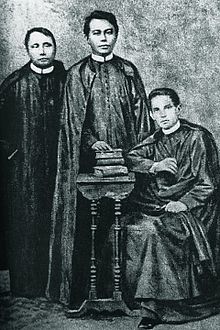This article needs additional citations for verification. (February 2017) |

Gomburza, alternatively stylized as GOMBURZA or GomBurZa ("Gom" for Gómes, "Bur" for Burgos, and "Za" for Zamora),[1] refers to three Filipino Catholic priests, Mariano Gómes, José Burgos, and Jacinto Zamora, who were executed by a garrote on February 17, 1872, in Bagumbayan, Philippines by Spanish colonial authorities on charges of subversion arising from the 1872 Cavite mutiny. The name is a portmanteau of the priests' surnames.
Gomburza incurred the hatred of Spanish authorities for fighting for equal rights among priests and leading the campaign against the Spanish friars. They fought on the issues of secularization in the Philippines that led to the conflict of religious and church seculars.[2]
Their execution had a profound effect on many late 19th-century Filipinos; José Rizal, later to become the country's national hero, would dedicate his novel El filibusterismo to their memory.[3] Mutiny by workers in the Cavite Naval Yard was the pretext[4][5] needed by the authorities to redress a perceived humiliation from the principal objective, José Burgos, who threatened the established order.[clarification needed]
Burgos was a Doctor of Philosophy and Arts[citation needed] whose prominence extended even to Spain, such that when the new Governor and Captain-General Carlos María de la Torre arrived from Spain to assume his duties, he invited Burgos to sit beside him in his carriage during the inaugural procession, a place traditionally reserved for the archbishop and who was a peninsular Spaniard. The arrival of the liberal de la Torre was opposed by the ruling minority of friars, regular priests who belonged to an order (Dominicans, Augustinians, Franciscans, etc.) and their allies in civil government. It was supported by the secular priests, most of whom were mestizos assigned to parishes and far-flung communities, who believed that the reforms and the equality that they wanted with peninsular Spaniards were finally coming. Not all Religious Orders were against Nativization like the Jesuits and Recollects; the Jesuits being suppressed in several European Empires for their support of Anti-Colonial Native Americans in the Paraguay Missions and the Recollects having given their parishes to native Filipinos when the Jesuits were expelled and Recollects transferring to former Jesuit territory in the Philippines. In less than two years however, de la Torre was replaced by Rafael de Izquierdo.[citation needed]
- ^ Chua, Michael "Xiao" (April 16, 2022). "MaJoHa for GomBurZa". The Manila Times. Retrieved August 31, 2022.
- ^ "The GOMBURZA were executed February 17, 1872". The Kahimyang Project. February 16, 2012. Retrieved December 4, 2019.
- ^ "Nacionalista Party History". Archived from the original on June 27, 2007. Retrieved July 30, 2007.
- ^ "The Secularization Issue and the Execution of Gomburza". Archived from the original on September 28, 2007. Retrieved July 30, 2007.
- ^ "Padre Jose Ma. Burgos". Retrieved July 30, 2007.